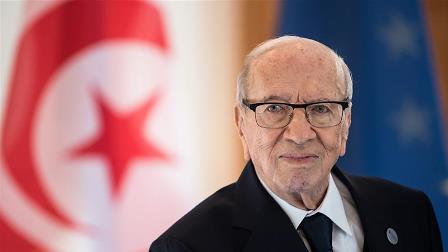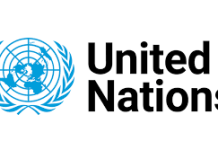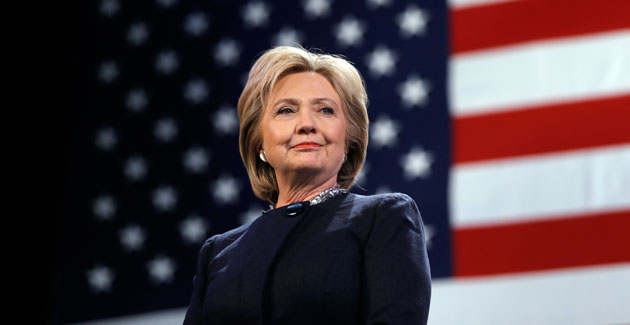Beji Caid Essebsi, a fixture of Tunisia’s political establishment who became the country’s first freely elected president after its 2011 pro-democracy uprising, died Thursday in a military hospital in Tunis, the capital, according to a statement by the Tunisian presidency. He was aged 92.
Essebsi was admitted to the hospital on Wednesday, following another brief hospitalization last month, shortly after two suicide bombers attacked security forces in Tunis, killing one police officer and wounding nine other people.
Under Essebsi’s leadership, Tunisia largely avoided the fate of Arab countries that were plunged into civil war after their uprisings, such as Syria, Libya and Yemen. But the transition has remained fragile — vulnerable to Tunisia’s fractured politics, an economy heavily dependent on tourism and the threat of deadly militant attacks.
Essebsi was appointed as Tunisia’s interim leader after nationwide protests ended the 23-year dictatorship of President Zine el-Abidine Ben Ali in 2011. He was elected president in 2014.
He was not a fresh face. Essebsi had served in various posts, including foreign minister, under Habib Bourguiba, Tunisia’s first post-independence leader, and as head of the parliament under Ben Ali. Some viewed that experience as useful with the country still reeling from revolution, at a time when Tunisia was unsettled by protests, political assassinations and terrorist attacks.
But for others, Essebsi was a symbol of the old autocratic establishment: aligned with other regional authoritarian leaders who were seeking to contain pro-democracy sentiments in the region, and indifferent, at best, to popular demands that officials from previous governments face justice for their alleged crimes.
After he was elected president, he detailed his priorities in an column written for The Washington Post. “We must solve the daunting economic and social problems that began in the Ben Ali era and were aggravated by three years of incompetent Islamist administration,” he wrote. “We must establish security in a country surrounded by insecurity. And we must strengthen our young democracy at a time when hopes for democracy elsewhere in the region are failing to take root.”
After briefly holding the post of prime minister in the wake of Ben Ali’s ouster, Essebsi stepped down in December 2011 after the newly elected Islamist-led assembly chose Moncef Marzouki as president.
Essebsi then founded a political party, Nidaa Tounes, in 2012 largely as a counterweight to Ennahda, the Islamist party that quickly ascended from the most heavily repressed group under the old regime to become Tunisia’s most powerful political group.
Nidaa Tounes attracted an array of secular-minded Tunisians hoping to challenge Ennahda’s rise. The rival parties dominated the Tunisian political scene for several years after Essebsi’s 2014 victory, forming an uneasy governing coalition in parliament that ultimately splintered in September.
Essebsi appealed to Bourguiba’s legacy during his 2014 campaign, casting himself in the mold of a secularist reformer and portraying his Islamist rivals as extremists out of step with Tunisia’s cosmopolitan character.
As president, he pursued several gender equality initiatives that challenged religious orthodoxy, including an order he issued in 2017 allowing Muslim women to marry non-Muslim men.
But critics said those moves masked Essebsi’s efforts to undermine accountability for crimes in the Bourguiba and Ben Ali eras. Essebsi spearheaded an “economic reconciliation” law passed in 2017 that granted conditional amnesty to former regime figures accused of corruption.
Essebsi himself faced scrutiny for his role in authoritarian abuses. A truth commission appointed to investigate and bring to light the human rights violations of Tunisia’s authoritarian regimes accused Essebsi of committing crimes while serving in Bourguiba’s government.
Specifically, its final report alleged that Essebsi oversaw mass arrests and unfair trials of political dissidents in the early 1960s in the wake of a failed coup attempt. The report also described him as complicit in the torture of prisoners while he was interior minister from 1965 to 1969.
Essebsi repeatedly dismissed the truth commission, saying he was “against settling the scores of the past.” His administration denied the group access to national archives, and parliamentary deputies from Essebsi’s party sought to obstruct its work.
When the truth commission released its final report in March, it called on Essebsi to offer an official state apology for more than 62,000 cases of human rights violations it chronicled between 1955 and 2013. Essebsi did not heed that call.
It was unclear who will succeed him. Tunisia’s constitution, ratified in 2014, permits the president to delegate his or her duties to the head of government for 30 days if temporarily incapacitated. If the president is unable to do so, the constitution stipulates that the country’s Constitutional Court should convene and declare the office of the presidency vacant. But Tunisia does not yet have a Constitutional Court.
Four years after the new democracy was supposed to have set up the court, parliamentary squabbling over its composition has delayed its establishment. Without it, the process for appointing a presidential successor remains unclear — and some experts warn that Essebsi’s death could usher in a constitutional crisis.
Sharan Grewal, a fellow at the Brookings Institution, said a legal loophole could stave off such a scenario. A temporary judicial body created in 2014 as a placeholder for a constitutional court is still operating, he said, and the parliament could pass a law granting it the power to declare the presidency vacant.
“I think you would avoid the constitutional crisis if you just amend the law in this way, and I think that is the most likely scenario,” he said. “I don’t think anyone has an interest in creating a constitutional crisis at this moment.”
The 2014 constitution indicates that after the presidency is declared vacant, the prime minister would take over for up to 60 days. If Tunisia reaches this step, that means Prime Minister Youssef Chahed would temporarily occupy the presidential seat in Carthage.
Chahed, who has served as prime minister since 2016, recently became one of Essebsi’s chief political rivals after breaking with Essebsi’s Nidaa Tounes party last year. Chahed now leads a new party, Tahya Tounes, composed of like-minded Nidaa Tounes defectors. Speculation has abounded that Chahed has been mulling a presidential run ahead of the upcoming election in November.












